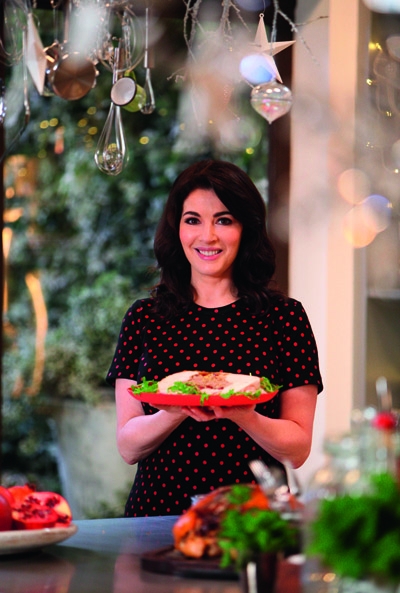Despite a wet summer, the recent crop of food programmes has been prodigious: six episodes of Nigellissima, eight of Nigel Slater’s Dish Of The Day, six of Lorraine Pascale’s Fast, Fresh and Easy Food, 40 of Jamie’s 15-Minute Meals and 25 of Hugh’s Three Good Things — truly a basket of plenty. Two cooking competitions (The Great British Bake Off and Masterchef: The Professionals) have dished up a total of 34 episodes; Heston Blumenthal has hand-reared seven bloated and inedible turkeys (Heston’s Fantastical Food), and Yotam Ottolenghi (Ottolenghi’s Mediterranean Feast) has concocted, in the kitchens of Morocco, Istanbul, Tunisia and Israel, four unexpectedly delicious treats.
This may seem like a season of bounty but in fact it is quite usual for our television schedules to boast a healthy stock of food shows all year round. One sort or another — the travelling chef, the competition, the novelty or the instructive — will always be available, and if there is none freshly made there will be a repeat: day or night, every day and (often in batches) at the weekend. At 3.50 a.m. on Wednesday 28 November, I see from the guide beside me, the Great British Food Revival was showing on BBC1. (‘Michel Roux Jr investigating strawberries’: just the thing to banish those pre-dawn gremlins.) On Sunday 25 November Jamie cooked all morning (on More4) and Hugh all afternoon (on Channel 4). In total, on that particular day, the main channels devoted nearly 12 hours to food programmes.
It is a long time since cooking shows were just about learning a skill. Now it is their business — they have made it a business — to captivate everyone. It makes sense: every one of us is a shopper and an eater, we are all hungry, we are a loyal market, and our appetite will never be satisfied — this eating lark is a lifelong commitment. No wonder every production wants us to support its team.
An audience is won not with radical ingredients or consistent results (which is apparently what those heavy books are all about) but with character. Personality — the personality of the cook — was once deemed strong enough to carry the show, and in those days incident or accident (or even just the odd sneeze) seemed possible. Now that the market is saturated, however, everyone seems to have lost their nerve. A ‘character’ is constructed for the whole show, and the cook must do his best to fit the bill.
Today, a Keith Floyd or a Rick Stein would be backed by a carefully furnished set in which ‘belongings’, each one matched to an agreed persona, were artfully stacked or strewn. Natural, talented, skilful and genuine cooks seem each to exist in a Truman Show of their own: their worlds turn round them. Every ‘possession’, to my cynical eye, seems to have been vetted, checked for blemishes, put in place and turned to face the camera. Everything we see — that postcard carelessly Blu-Tacked to the fridge door; that snail on a terracotta flowerpot; that Bialetti espresso-maker on the windowsill — is there to tickle our fancy. Accompanying music will create the atmosphere, as is appropriate, of an impromptu party, a leisurely dinner, or a warm hearth.
Both Nigel Slater and Nigella Lawson are accomplished, successful and celebrated food writers of a similar age. Both emphasise that they are home cooks rather than restaurant chefs. Both enjoyed great success in print before taking to the small screen. Both host cosy half-hour shows, named after themselves, in which they are filmed shopping for ingredients and then cooking ‘at home’.
Nigella is intimate and beckoning, tugging the camera behind her like a darling little pet. She is buoyant, convivial and flirtatious. We find her in a twinkling bower, which ideally represents the concept of Nigellissima, and we must make-believe that this is the dwelling place of our hostess. There is no deception — this is television, after all — but only a proposal: accept this fantasy. If we are not prepared to swallow the whole chocolate box, we might as well switch off.
Nigellissima may be fantastical but we sense that its artifice has, at least, been tailored to fit. Nigel Slater, on the other hand, seems to have been nipped and tucked in the editing suite. He behaves as we would expect — chopping and cooking in near-silence, staring into the pot as if he’s in a trance, trying to avoid catching our eye — but the final product has been trimmed and garnished with whimsy and nonsense. It’s massively annoying: those quirky titles, that jazzy editing and the endless perky little notices and storyboards make me grind my teeth, not lick my lips. We could just have a bit of quiet, couldn’t we? We don’t need to be distracted, but absorbed. Nigel enjoys listening to the ingredients getting to know each other in the pan. Can’t we?





Comments